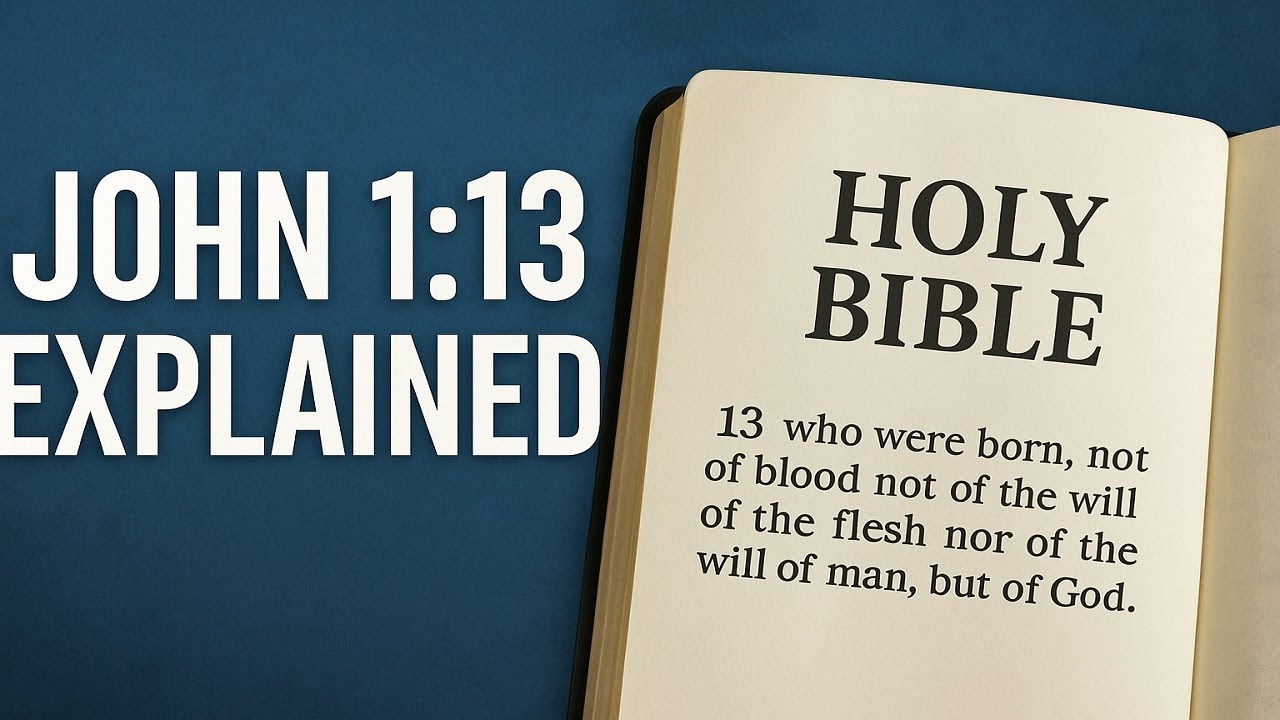Have you ever read a line in the Bible that just stops you in your tracks? A phrase so packed with meaning that you know there’s a universe of truth hiding within its few words? For me, John 1:13 is one of those lines. It sits right after the beautiful promise in verse 12 about receiving the right to become children of God, and it defines that experience in a way that shatters our everyday understanding of identity and belonging.
This verse forced me to ask some big questions about faith, family, and what it truly means to be spiritually alive. Getting a real John 1:13 explained is more than a theological exercise; it’s a journey to the very heart of the Christian faith. It’s a declaration that our spiritual identity isn’t a product of our family tree, our personal ambitions, or even our most determined efforts. It is something else entirely. Something supernatural. Something divine.
Together, we’re going to pull back the layers on this powerful verse. We’ll explore what it doesn’t mean, what it does mean, and why it matters so profoundly to anyone seeking a genuine relationship with God.
More in John Chapter 1 Category
Key Takeaways
- A Divine Act: Being “born of God” is a supernatural event initiated by God, not a human achievement. It is a spiritual rebirth, completely separate from our physical birth.
- Not By Inheritance: This new birth is not passed down through family lineage (“not of blood”). Your spiritual status is not dependent on your parents’ faith.
- Beyond Human Effort: It cannot be achieved through personal desire (“the will of the flesh”) or a calculated human plan (“the will of man”). Self-improvement and sheer willpower are insufficient.
- A New Identity: To be born of God means receiving a new nature and a new identity as a child of God, fundamentally changing your relationship with Him and your purpose in the world.
- The Result of Faith: While the birth itself is God’s work, it is given to those who “receive him” and “believe in his name,” as stated in the preceding verse, John 1:12.
What Does the Bible Even Mean by “Born Again”?
Before we can really dig into the specifics of verse 13, we have to get our heads around this concept of being “born.” It sounds a bit strange, doesn’t it? The idea pops up again famously in John chapter 3, when a religious leader named Nicodemus comes to Jesus by night. Jesus tells him flat-out, “Truly, truly, I say to you, unless one is born again he cannot see the kingdom of God.”
Nicodemus is baffled. He takes it literally, asking how a grown man can re-enter his mother’s womb. But Jesus is obviously talking about something spiritual, not physical. He’s speaking of a second birth, a spiritual beginning that is as real and as vital as our first, physical one.
This is the context for John 1:13. The verse isn’t just a standalone thought; it’s the explanation behind the promise. It clarifies the how and the by whom of this new birth. It defines the origin of this new life, and it does so by first telling us where it doesn’t come from.
If Not By Blood, Then How? Unpacking “Not of Blood”
The first thing John tells us is that these children of God were born, “not of blood.” In the ancient world, bloodline was everything. It determined your status, your inheritance, your profession, and your identity. To be born into the right family, the right tribe, or the right nation was a matter of immense significance. For the Jewish people, being a physical descendant of Abraham was a source of great pride and perceived spiritual security. They were God’s chosen people, after all.
But John blows that entire concept out of the water. He makes it crystal clear that your spiritual standing before God has absolutely nothing to do with your physical DNA. You can’t inherit salvation. You don’t get a pass into the family of God just because your mom and dad were believers. It’s a profoundly personal and individual reality.
Does My Family Tree Matter to God?
I’ve always been proud of my family history. I can trace my father’s side back to Irish immigrants who arrived with nothing and built a life through sheer grit. On my mother’s side, there’s a long line of farmers, people connected to the land, who understood seasons of planting and harvest. That heritage is a part of me; it’s in my blood. For a long time, I think I subconsciously assumed my faith worked the same way. I grew up in the church. My parents loved God. Therefore, I was “in.”
But John 1:13 gently corrected me. It showed me that while I can be grateful for my family’s legacy of faith, it isn’t my faith. My spiritual identity wasn’t passed down like my last name or my ridiculously stubborn cowlick. God doesn’t have grandchildren; He only has children. Each one of us must come to Him individually to receive this new birth. My earthly bloodline gives me a history, but only the divine work of God can give me a future.
What About Human Desire? Exploring “Nor of the Will of the Flesh”
Next, John says this birth is “nor of the will of the flesh.” This phrase digs a little deeper into our human experience. The “flesh” in the Bible often refers to our natural, human nature—our impulses, our desires, our appetites, our ambitions, all the things that drive us apart from God’s influence.
This means that being born of God is not the result of some passionate, emotional impulse. It’s not something you can just “work up” within yourself. You can’t just want it badly enough in the same way you might want a promotion or a new relationship. That kind of wanting comes from the “flesh”—it’s a human-centered desire.
Think about it. Our natural desires often lead us away from God, not toward Him. The “will of the flesh” wants comfort, control, and self-gratification. The new birth, however, is a radical reorientation away from self and toward God. It is a fundamental change of our desires, not the fulfillment of our old ones. Therefore, it cannot possibly originate from the very nature it intends to transform. It has to come from an outside source.
Can I Achieve This Myself? The Meaning of “Nor of the Will of Man”
This third negative clause—”nor of the will of man”—closes the loop. If this new birth isn’t from our lineage (“blood”) or our internal desires (“flesh”), it’s also not from our calculated, conscious efforts. The “will of man” speaks to human volition, our ability to make a plan and execute it. It represents our best-laid schemes, our self-improvement projects, and even the influence of another powerful human being.
You cannot be born of God through sheer willpower. You can’t read the right books, follow a seven-step plan, or meditate your way into a new spiritual nature. It’s not a self-help project. Likewise, no pastor, priest, parent, or spouse can “will” it for you. Their decision cannot save you.
Is This a Matter of Self-Improvement?
I spent a good portion of my early twenties trying to become a better person through the “will of man.” I was frustrated with my own shortcomings and determined to fix them. I built elaborate systems for self-discipline. I read books on habit formation, woke up at 5 a.m., took cold showers, and journaled my progress.
And for a while, it sometimes felt like it was working. I became more productive, more disciplined. But I was still the same person on the inside. My core anxieties, my selfishness, my deep-seated fears—they were all still there, just with a better-managed exterior. I was painting the outside of a broken-down house. My striving, my “will,” couldn’t change the foundation. Real, lasting transformation didn’t come from my plan. It came when I finally gave up on my own efforts and admitted I couldn’t do it myself. It came not from my will, but from surrendering to God’s.
So, What Does “Born of God” Truly Signify?
After tearing down all the human-centered ways this birth doesn’t happen, John finally gives us the glorious, simple truth. This birth is “of God.”
That’s it.
It is a supernatural, divine, and miraculous work from start to finish. It is God’s initiative. He is the actor. We are the recipients. It’s not a collaboration where we do our part and He does His. It is a creative act of God, like speaking light into darkness in Genesis. He imparts new, spiritual life to a person who is spiritually dead.
Where Does This New Life Come From?
This new life flows directly from the nature of God Himself. To be “born of God” means receiving a new spiritual DNA, so to speak. The Holy Spirit creates a new nature within us that is responsive to God, that loves His ways, and that recognizes Him as Father.
It’s a fundamental transformation. A person who was once content living for themselves now finds joy in living for God. A heart that was once cold and indifferent to spiritual things is now alive and sensitive to His presence. It’s a change so profound the Bible calls it being made a “new creation” (2 Corinthians 5:17). This isn’t just turning over a new leaf; it’s being given a new life.
How Does This Change My Identity?
Being born of God is the ultimate identity shift. Your primary definition is no longer tied to your job, your nationality, your family, or your failures. Your primary identity becomes “child of God.” This changes everything.
- A New Relationship: You are no longer a distant creature trying to appease a faraway creator. You are a beloved child in an intimate relationship with a loving Father.
- A New Purpose: Your life is no longer just about your own happiness or success. You now have a part to play in God’s eternal purposes.
- A New Power: You are not left to live this new life on your own. The Holy Spirit resides within you, giving you the power to change and grow in ways you never could before.
- A New Future: Your ultimate destiny is secure. You have an inheritance that is, as 1 Peter says, “imperishable, undefiled, and unfading, kept in heaven for you.”
What’s the Connection Between John 1:12 and 1:13?
It’s absolutely crucial to read verse 13 in light of verse 12. They are two sides of the same coin. Verse 12 describes the human response: “But to all who did receive him, who believed in his name, he gave the right to become children of God.”
Our part is to believe. To receive. To put our trust in Jesus.
Verse 13 then describes God’s divine action. When we believe, He acts. He performs the miracle of the new birth. Our faith doesn’t cause the new birth in the sense that we earn it, but it is the channel through which God’s life-giving grace flows. He has chosen to connect His sovereign, supernatural work of regeneration to our human act of faith. For a deeper theological exploration of this divine work, known as regeneration, many seminaries offer excellent resources. For example, the faculty at Dallas Theological Seminary often publish articles that unpack these profound truths.
Belief is the outstretched, empty hand. The new birth is the gift of life God places in it.
How Can I Be Sure I Am “Born of God”?
This isn’t a call to endless, anxious navel-gazing. The Bible gives us clear, observable evidence that this divine life is present in a person. The apostle John, in his letter of 1 John, gives several “tests” or assurances of this new birth. This isn’t a checklist for salvation, but rather the expected fruit that grows from a life that has been truly transformed.
Do you want to know if you have been born of God? Look for the evidence:
- Belief in Jesus: Do you genuinely believe that Jesus is the Christ, the Son of God, who died for your sins and rose again? (1 John 5:1)
- A Pattern of Righteousness: Are you perfect? No. But do you see a new desire to live a life that pleases God? Is there a consistent, though imperfect, practice of righteousness in your life, and do you feel conviction when you sin? (1 John 2:29)
- Love for Other Believers: Do you have a genuine, growing affection for other Christians? Do you see them as your brothers and sisters in a new family? (1 John 4:7)
- Victory Over the World: Does your faith give you a new perspective on the world’s values and systems? Are you less controlled by the pursuit of possessions, prestige, and pleasure? (1 John 5:4)
A Birth That Changes Everything
The truth of John 1:13 is humbling and exhilarating all at once. It’s humbling because it removes all grounds for human pride. We contribute nothing to our spiritual birth. It is not of our bloodline, our desires, or our decisions. We cannot boast in our heritage or our efforts.
And it’s exhilarating because it means our salvation is not dependent on our fickle human performance. It rests entirely on the power and grace of God. He is the one who gives life. He is the one who adopts us into His family. He is the one who initiates and secures our relationship with Him.
To be “born of God” is to be lifted out of an identity defined by dust and decay and placed into an identity defined by an eternal, loving Father. It is the greatest miracle of all, and it is a gift offered to all who will simply believe.
FAQ – John 1:13 Explained

How can I know if I have truly been ‘born of God’?
You can know you have been ‘born of God’ by observing certain evidences such as genuine belief in Jesus Christ, a desire to live righteously, love for other believers, and a newfound perspective on worldly values. These fruits indicate the presence of the divine life within.
Does my family’s religious background influence my spiritual rebirth?
No, your family’s religious background does not determine your spiritual rebirth. John 1:13 emphasizes that being born of God is a personal, individual experience that is not inherited through bloodline but is a supernatural act initiated by God.
What role does faith play in being ‘born of God’?
Faith plays a crucial role in receiving the divine gift of new birth. Believing in Jesus and trusting in His name are the channels through which God’s life-giving grace flows, making faith the human response that aligns with God’s divine act of regeneration.
What does it mean to be ‘born of God’ according to John 1:13?
Being ‘born of God’ signifies a divine, supernatural rebirth initiated by God, not resulting from human effort, family lineage, or personal desires. It involves receiving a new spiritual life and identity as a child of God, fundamentally transforming one’s relationship with Him and purpose in the world.






